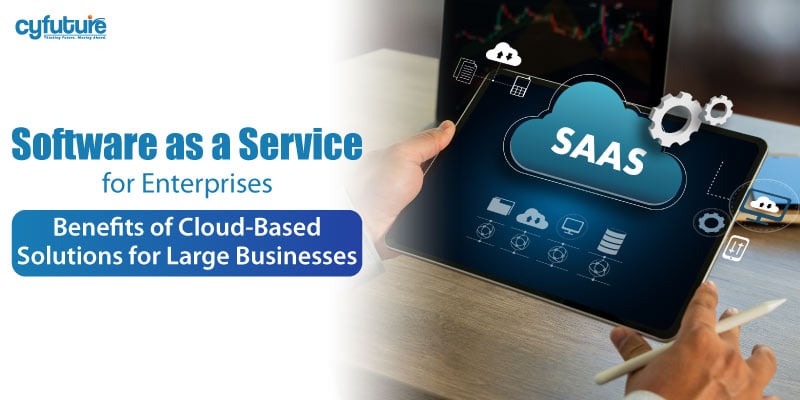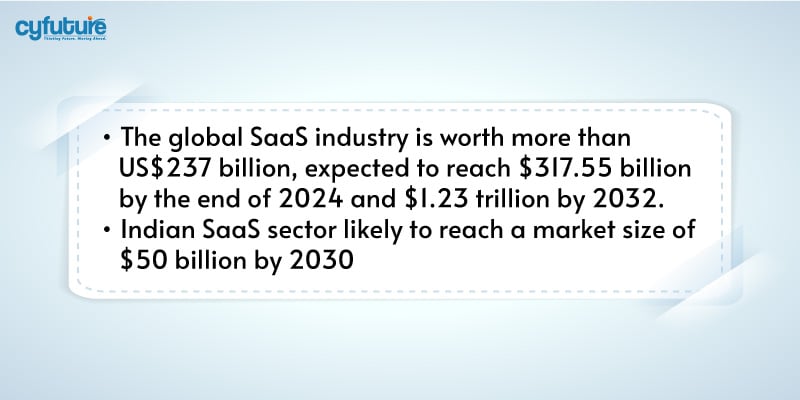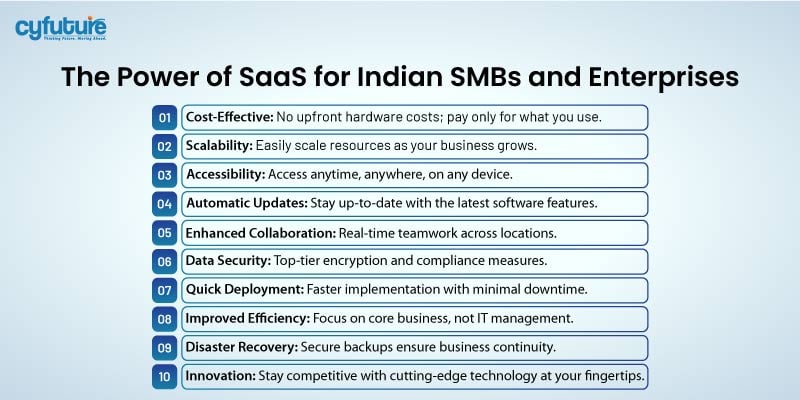-
Get Cloud GPU Server - Register Now!
Toggle navigation

We live in a rapid, tech-centered world. Big businesses are adopting Software as a Service (SaaS) tools more and more.
To increase their work efficiency, drop costs, and grow scalability. Just for your knowledge, an ordinary SaaS firm has 36,000 clients. Now that’s something. The much welcome change from the usual Software delivery models lets businesses tap into Software through the internet. Plus, there’s no need for huge on-site infrastructure.
Check this out: an impressive 99% of businesses use at least one SaaS solution, and 86% of the companies that use SaaS experience higher employee engagement.
This handy blog will uncover the endless perks of cloud-based tools for big businesses. It will focus on SaaS cloud hosting and what it means for their operations.
Are you ready to dive in?
Consumers can access software programs online with Software as a Service using a cloud computing approach. Instead of purchasing and installing Software on individual computers, organizations subscribe to SaaS applications hosted on remote servers. This model provides various benefits, such as automatic updates, scalability, and decreased IT costs.
More and more large companies are shifting towards SaaS.
Why? They need flexibility, scalability, and budget-friendly options. The old-style software systems can get too bulky and ineffective when a company grows. Nowadays, firms want different things. They need SaaS models. From this year till 2028, experts predict the SaaS market will balloon at a CAGR of 27.5%.
Can you believe it might reach $716.52 billion?

Companies often pick SaaS platforms as they cut costs. Traditional Software requires hefty upfront spending on licenses and system setup. On the other hand, SaaS avoids these expenses by offering applications through subscription services. This model enables businesses to use resources more efficiently and avoid substantial capital investments.
Big companies frequently go through variations in demand. SaaS tools offer amazing flexibility. They let companies adjust their use based on what they need now. Businesses can grow their SaaS applications with ease, be it by adding more users or boosting storage. There’s no need for extra hardware or tricky setups. This adaptability is especially advantageous when experiencing sudden growth or seasonal surges in demand.
With folks working from varied places, getting to tools easily is critical to staying efficient. You can work together with your team, no matter where you are, by tapping into SaaS applications online. This ability improves communication and promotes innovation by helping diverse teams collaborate more efficiently.
Big businesses place high importance on keeping data safe. They trust SaaS firms who make security a priority by investing in protective measures like encryption, multiple-check authentication, and regular data backups. Many SaaS firms stick to industry standards and rules such as A\GDPR or HIPAA. This helps businesses stay compliant without needing to use a ton of their resources. By making security a top concern, companies decrease the risks related to data leaks and online threats.
Big companies often discover that handling their technology systems consumes lots of resources. Using SaaS tools can let them hand off many tech tasks to service companies. This encompasses overseeing servers, updating Software, and monitoring security. Consequently, internal IT teams can concentrate on strategic projects instead of regular upkeep duties. This change increases operational efficiency and boosts employee morale by decreasing burnout from IT support.
Big companies frequently use various software applications to oversee different parts of their activities. SaaS solutions often provide integration features that enable companies to link other applications easily. This match-up smooths out steps and assures easy data movement between various platforms, boosting how things run in the end.
Looking at the price variances between SaaS hosting and standard software licensing, several elements can impact a business’s budget management and work productivity.
Traditional software licensing often requires a significant first-time investment. This means businesses, especially smaller ones, must purchase licenses outright. It can be a big obstacle. The whole software cost is usually paid upfront, plus the price of obligatory hardware and ongoing upkeep fees.
However, SaaS (Software as a Service) operates differently. It’s subscription-based. Companies pay a regular fee to use the Software, maybe monthly or yearly. This framework enables businesses to circumvent substantial preliminary costs, facilitating budgeting and cash flow management. The lower initial financial commitment associated with SaaS can be particularly advantageous for companies looking to invest their resources elsewhere.
At first, SaaS subscriptions might seem like a good deal, but it’s vital to think about it long-term. Ultimately, subscriptions might be pricier than simply purchasing older software licenses outright. This is crucial to consider for businesses aiming to use the software for a long stretch. Nevertheless, conventional licensing might also have undisclosed expenses like fees for upgrades and maintenance that can build up gradually.
Organizations are responsible for maintenance and support with traditional software licensing, potentially resulting in extra expenses. This involves recruiting IT personnel to handle installations, updates, and resolving problems. Contrarily, SaaS suppliers handle all upkeep tasks. This service is part of the subscription fee. It not only cuts costs right away but also lessens the burden on in-house IT teams. They can then focus more on big projects instead of routine maintenance.
Software as a Service solution provides more scalability than traditional software licenses. Businesses can modify their subscription levels according to their immediate requirements, allowing them to add or remove users without facing significant financial consequences. This adaptability is essential for companies going through expansion or seasonal changes in demand.
Alternatively, expanding traditional Software typically requires acquiring more licenses or hardware, which can be expensive and time-consuming. Therefore, SaaS offers a more flexible financial model that adjusts to evolving business circumstances.
SaaS apps save money since they can be reached from anywhere. They’re in the cloud so you can use them on any device with internet. This makes working from home cheaper because there’s no need for pricey gear or servers. Standard Software is different. It must be downloaded on specific devices or servers, limiting how you can use it. This may lead to extra costs like remote desktop options or VPNs.

Even though SaaS brings major benefits, large companies encounter numerous challenges implementing these solutions:
Are you thinking about SaaS cloud hosting?
Cyfuture India Pvt. Ltd. shines in this field. They give personalized solutions for big businesses. All their SaaS services meet the special needs of companies. This ensures an easy move to based in the cloud services.
Cyfuture India Pvt. Ltd. recognizes that every business has unique needs. Companies can customize their SaaS hosting services by selecting features and resources that match their operational objectives.
Cyfuture prioritizes security by implementing top practices to protect enterprise data. Their dedication to safeguarding data and following regulations ensures businesses can operate securely.
Moving to a SaaS model might be challenging, but Cyfuture provides specialized assistance to help companies navigate the transition. Their group of experts offers help with setup, migration, and continuous management, guaranteeing a seamless journey.
The shift to Software as a Service (SaaS) allows big companies to enhance efficiency and expand in a highly competitive environment. Organizations can experience substantial cost savings, increased scalability, better collaboration, strong security practices, and minimized IT pressures by adopting Cyfuture India Pvt—Ltd cloud-based solutions.
With businesses evolving due to technology and market changes, embracing SaaS will be crucial for staying competitive in the digital economy. Adopting this model enables companies to concentrate on their primary skills while utilizing the knowledge of specialized service providers to handle their software requirements efficiently.
To sum up, saas hosting offers cloud-based solutions that equip big companies with the necessary resources to succeed in the rapidly changing landscape, allowing them to stay flexible and adaptive in the face of upcoming obstacles.